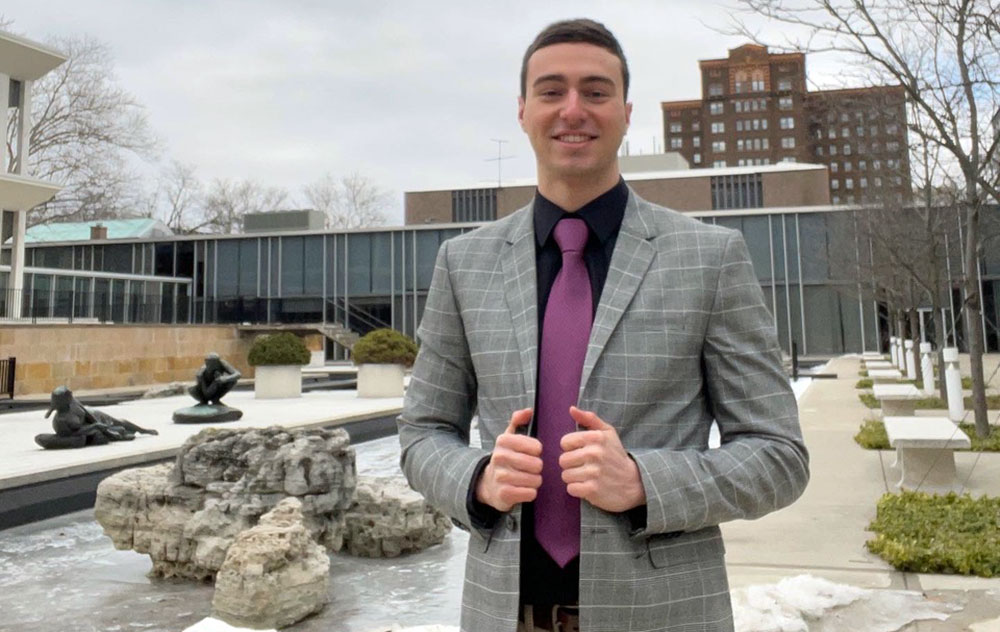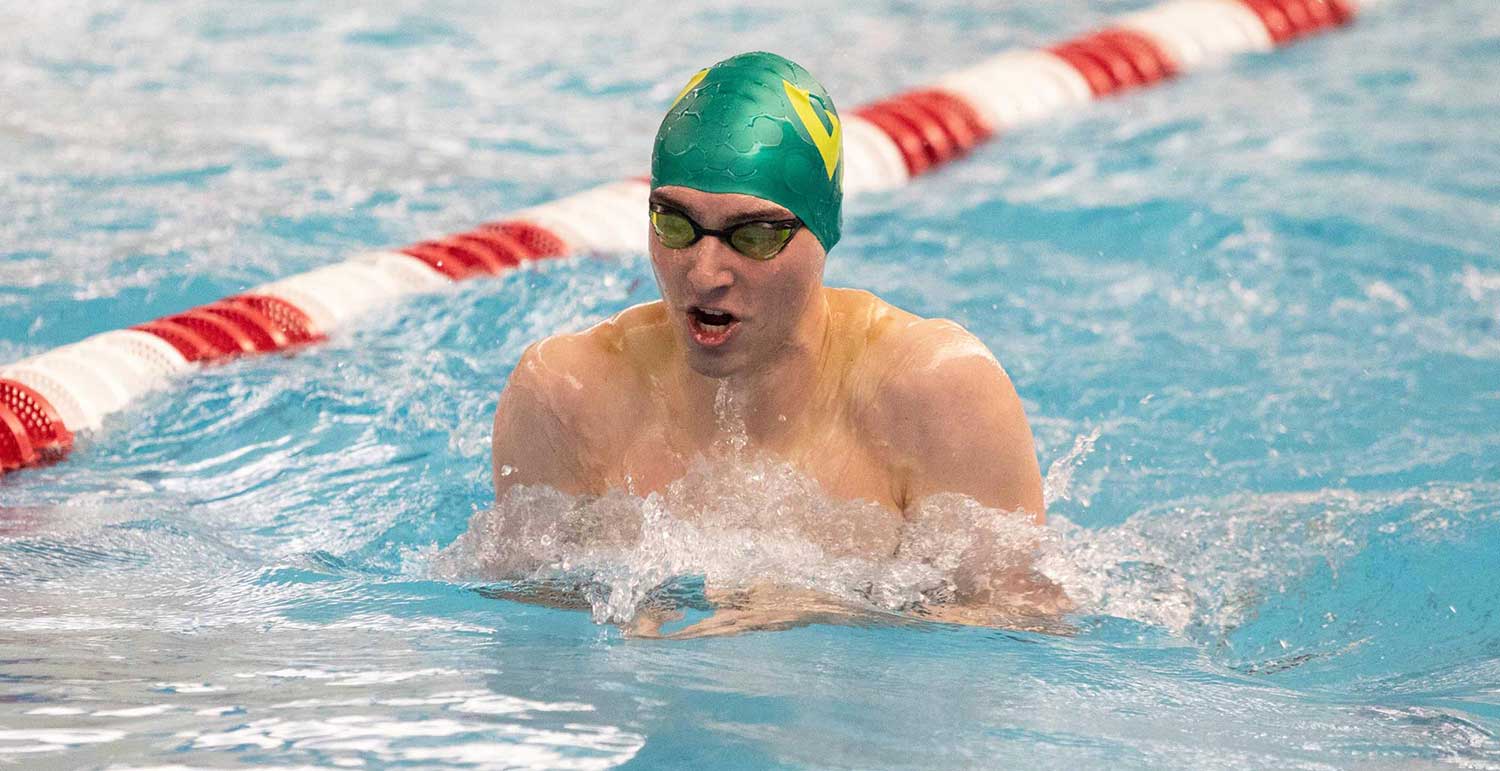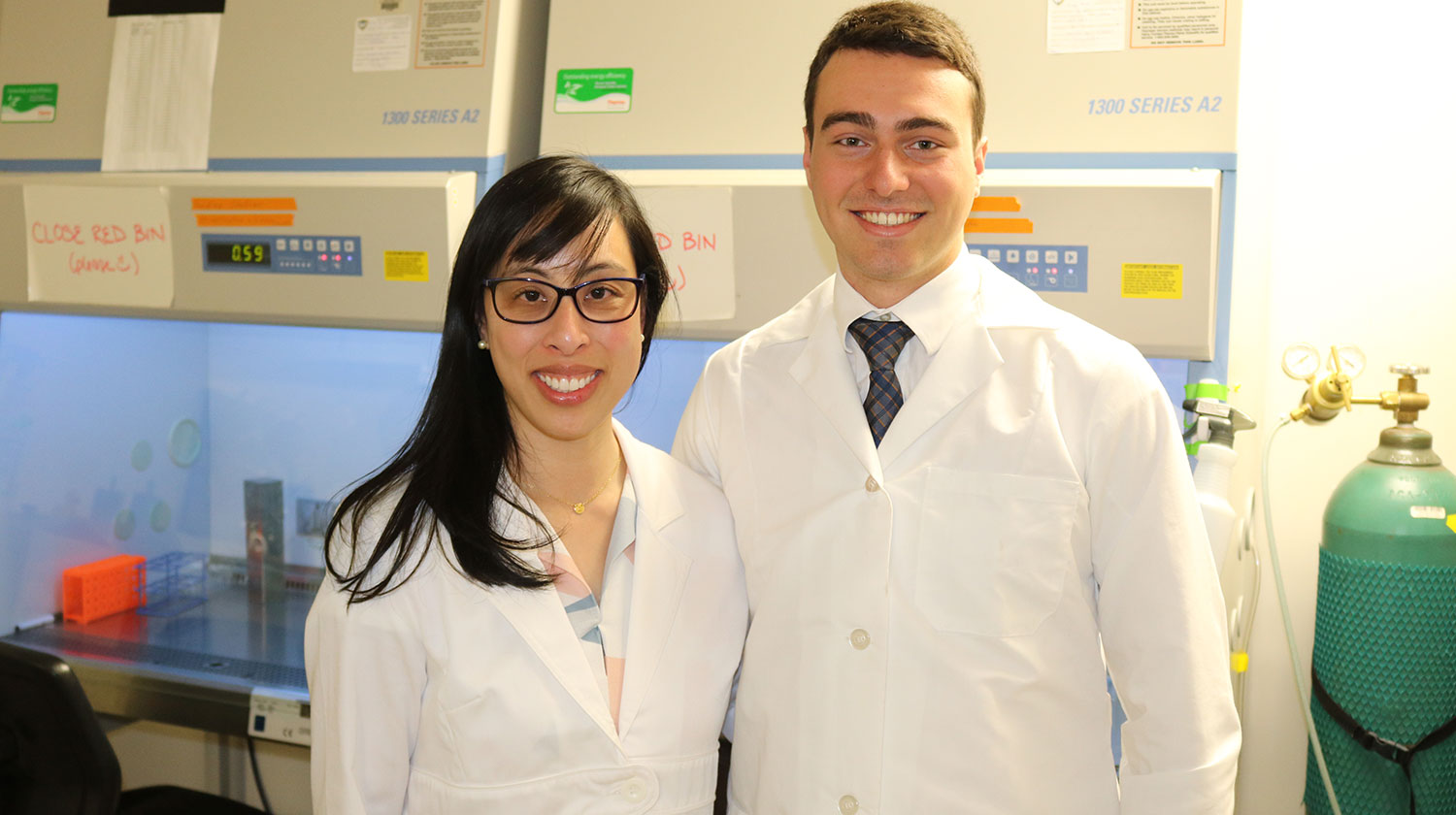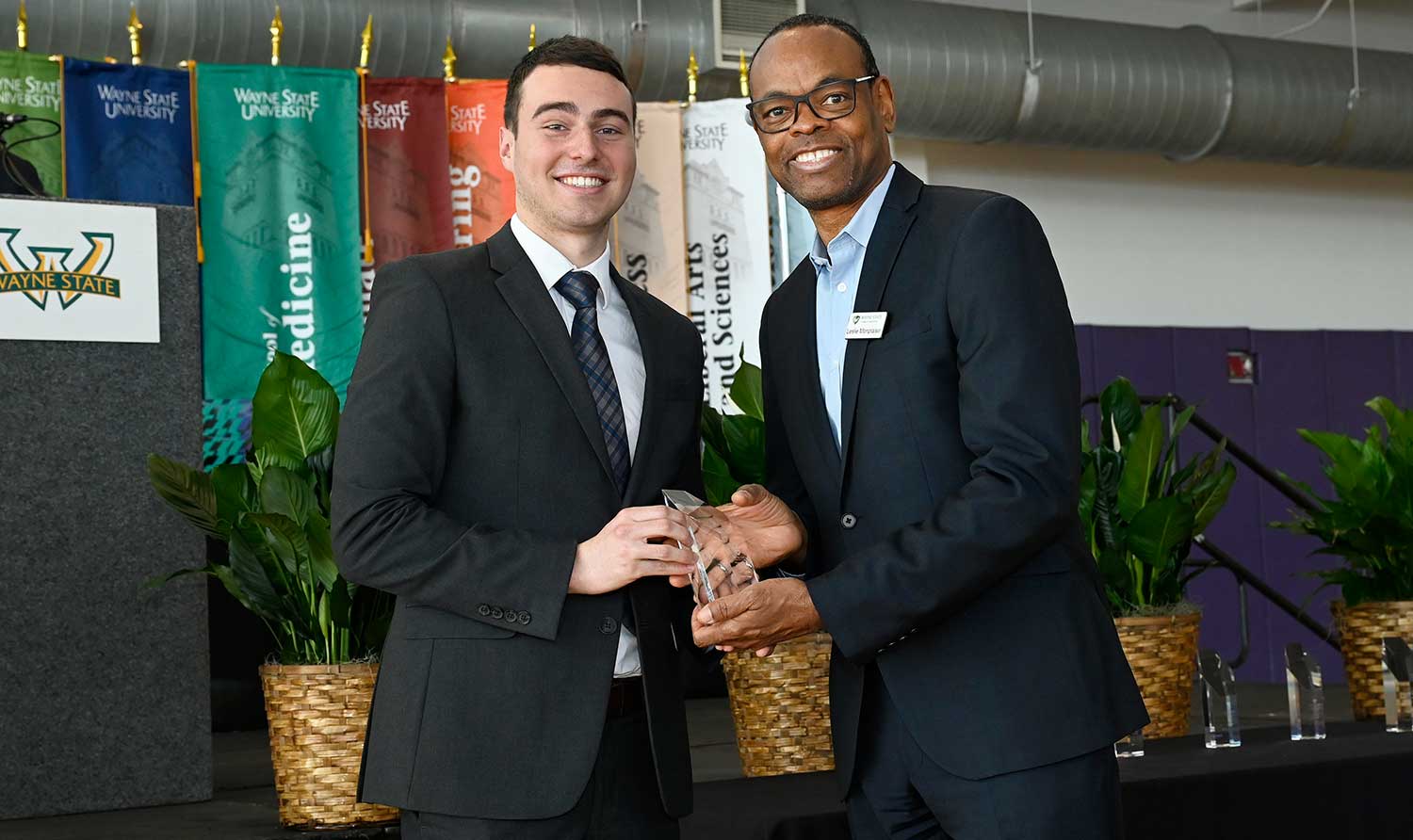Turning suffering into a superpower: How Wayne State grad Chris Spencer persevered to become a champion for diabetes research

In early 2018, Dr. Chelsea Boet (née Cunliffe) — an alumna of the Wayne State University School of Medicine — was diagnosed with stage 4 colorectal cancer. She was 34 years old and had just given birth to her second child. The news sent shock waves through her entire family, including her cousin Chris Spencer, who at the time was a senior at Lumen Christi Catholic School in Jackson, Michigan.
The diagnosis meant that five members of Spencer’s extended family across three generations had colon cancer. Genetic testing ruled out Lynch syndrome, an inherited predisposition to certain types of cancer, but questions remained.
“My family realized there was kind of a medical mystery going on,” said Spencer.
A desire to find answers is what initially piqued Spencer’s interest in biomedical engineering (BME). That interest, along with the dream of swimming competitively that he had carried since the age of 7, ultimately led him to Wayne State.
“I could tell immediately that not only was there a culture of winning in the swimming program, but also real attention to growth and development as a human being, and success in the classroom,” he said.
Spencer also liked the cohort-based structure of the biomedical engineering program. He could have the best of both worlds: a small like-minded community within a large urban atmosphere.
He flourished as a first-year student-athlete during the 2018-19 academic year. He excelled in his classes and performed well in the pool. At the GLIAC Championships, he swam his season-best times in all of his events, backstroke and individual medley being his specialties. After the meet, on the bus ride from Cleveland to Detroit, Spencer thought about how much his life had changed for the better over the last year.
“Little did I know,” he recalled, “that three months later I was going to come face to face with the biggest challenge that maybe I’ll ever have.”

In April 2019, Spencer noticed he wasn’t feeling well, particularly at practice. He passed it off to lifestyle changes — moving into an off-campus apartment, starting summer classes — or a minor virus. Over the next month, he saw more concerning symptoms such as frequent urination and significant weight loss. Spencer visited his doctor and underwent some tests.
On June 4, 2019, he was diagnosed with Type 1 diabetes.
Spencer spent the next three days in the hospital getting rehydrated and “basically relearning how to live,” he said. “I’m really grateful to my mom. She was a second pair of ears during the whole hospital stay. She took all the notes and helped me arrange my follow-up appointments.”
He stayed with his classes that summer but took a break from swimming, rejoining the team in the fall; however, managing his insulin amid a crowded schedule — particularly in the “honeymoon period” of his disease — was a daunting task. During his sophomore season, he had low blood sugar problems at almost every practice.
“I had to reexamine my swimming approach, and learn when to push myself and when to be more cautious,” said Spencer. “I had plenty of bad days.”
He recalled one particular day in November 2019, when the team was grinding through two-a-day practices. Spencer was experiencing his worst week yet of blood sugar management, completing about one-third of every workout and spending the rest of the time troubleshooting. He exited the pool and broke down, confronting the fact that he might have to step away from the sport he loved — all while the volume of his class work began to overwhelm him. A pep talk from his coach, Sean Peters, would prove to be a turning point.
“Sean pulled me aside and talked to me for a good 20 minutes,” recalled Spencer. “He said, ‘We believe in you as much as you believe in this team, and we want to support you in any way we can.’”
Kim Clexton, academic advisor for the Department of Athletics, worked with Spencer on a plan to get his studies back on track. Patti Dixon in Counseling and Psychological Services helped him with coping mechanisms. Peters told him that if he needed to take a day or two away from practice, that was OK.
“My whole trajectory changed,” said Spencer.

In early 2020, Spencer connected with the College Diabetes Network as part of its fellowship program. He was invited to attend an American Diabetes Association conference, which ended up being held virtually due to the COVID-19 pandemic, where he was paired with a mentor and had the opportunity to network with scientists and professionals dedicated to diabetes research.
“That was when I knew that I was in a special position to be not only an advocate for people with diabetes, but also to use my growing expertise in biomedical engineering to make an impact in the diabetes sector and improve the quality of life for patients,” he said.
Spencer’s remaining time as a Wayne State biomedical engineering student would be almost entirely devoted to diabetes. Spencer has used the BME design lab of Brian Mundo, an assistant professor and director of BME’s capstone program, to pursue diabetes-related projects, including a continuous glucose monitor design and a method of improving microencapsulation for pancreatic islet transplantation.
In January 2021, Spencer was recruited by Assistant Professor Mai Lam to work in her lab after Lam gave a guest lecture to Mundo’s class on biomaterials and tissue engineering concentration. Spencer led a project that received two cycles of Undergraduate Research Opportunities Program funding, with the objective of constructing tissue-engineered blood vessels using the lab’s existing ring stacking method, examining a normal glycemic control and two hyperglycemic groups to gauge differential gene expression and find inflammatory markers.
Spencer, along with Dixon and Dean of Students David Strauss, also co-founded a support group for Wayne State students, faculty and staff dealing with Type 1 and Type 2 diabetes.
“I’ve really been dedicating myself to understanding as much about diabetes as possible,” he said.

Now, Spencer is graduating with honors from Wayne State University with a degree in biomedical engineering. He received the College of Engineering’s Wingerter Award — the highest recognition given by the college to graduating seniors who have excelled in character, leadership and scholastic ability — as well as the Department of Athletics Deans’ Award for having the highest cumulative GPA among engineering student-athletes.
As he walks into the Wayne State Fieldhouse for commencement, Spencer will be thinking about how and why he persevered: his faith, the family and teammates who cheered him on, the mentorship of his professors, and the creativity of his fellow BME students.
“I want to thank everyone that I’ve shared this experience with,” he said, “because I wouldn’t be where I am without them.”
Spencer has also dedicated his career to his cousin, Dr. Chelsea Boet, who died in November 2020.
“As a physician, she saw the value of doctors being there for their patients, as well as the people behind the scenes who put the tools in doctors’ hands,” he said.
Spencer will again participate in the College Diabetes Network fellowship with an opportunity to attend the ADA Scientific Sessions from June 3-7 in New Orleans. This fall, his educational journey will continue 40 miles west of Wayne State as he starts graduate school at the University of Michigan, where he will work in the lab of Professor Lonnie Shea.
Long term, Spencer is unsure whether he will forge a career path through academia or industry. What he wants above all else is for more research discoveries put into clinical applications.
“I want to see a child with a genetic or environmental risk of Type 1 diabetes never ending up diagnosed with that disease because of something that I or people I work with innovate,” he said. “I also want someone with a progressed disease like I have to live a life of restored autonomy, whether through a medical device or a functional transplant.”
As he reflects on his time at Wayne State and looks toward the future, Spencer is certain that he would not be so professionally entrenched in the battle against diabetes if it had not been for his own experience with the disease.
“Sometimes suffering is seen as a hindrance or a reason to be discouraged,” he said, “but when you see the good things that can come from it in retrospect, suddenly suffering becomes a superpower.”